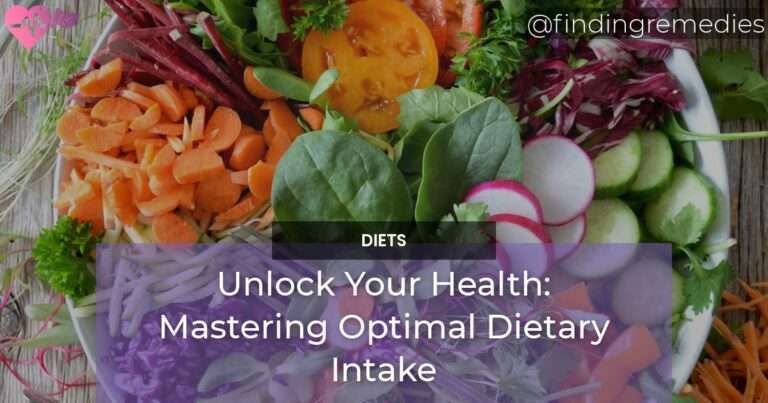Eating healthy has been a popular topic for many years. While everyone knows it’s important to take care of your body, understanding how to get the most out of your diet can be a challenge.
Maximizing dietary intake for optimum health is a great way to ensure that you’re getting the most out of your meals. With the right approach, you can make sure that your meals are providing you with all the essential vitamins, minerals, and nutrients your body needs.
In this article, we’ll take a look at some tips and tricks for maximizing your dietary intake for better health.
Table of Contents
Key Components of a Healthy Diet
Maintaining a healthy diet is crucial for overall well-being. A well-rounded diet should be rich in essential nutrients, including healthy fats, whole grains, lean protein, complex carbohydrates, fiber, vitamins, minerals, antioxidants, and phytochemicals. Here are a few key components that make up a healthy diet:
– Whole Grains: Whole grains are an excellent source of fiber, vitamins, and minerals. They help in maintaining a healthy gut and reducing the risk of chronic diseases. Some examples of whole grains include brown rice, quinoa, whole wheat, and oats.
– Lean Protein: Lean protein is essential for maintaining muscle mass, repairing tissues, and providing energy. Some examples of lean protein include chicken, fish, tofu, and legumes.
– Healthy Fats: Healthy fats are vital for brain function, hormone production, and overall health. Some examples of healthy fats include nuts, seeds, avocado, and fatty fish.
– Complex Carbohydrates: Complex carbohydrates are rich in fiber, vitamins, and minerals, and take longer to digest, providing sustained energy levels. Some examples of complex carbohydrates include sweet potatoes, beans, lentils, and whole-grain bread.
– Fiber: Fiber is essential for maintaining a healthy gut and reducing the risk of chronic diseases. Some examples of fiber-rich foods include fruits, vegetables, whole grains, and legumes.
– Vitamins and Minerals: Vitamins and minerals play a crucial role in maintaining overall health, including strong bones, healthy skin, and a robust immune system. Some examples of vitamin and mineral-rich foods include leafy greens, nuts, seeds, and berries.
To ensure that you are getting enough vitamins and minerals, aim to incorporate a variety of colorful fruits and vegetables into your diet. You can also consider taking a multivitamin or supplement if necessary.
Common Misconceptions About Dietary Intake
There are many misconceptions about dietary intake that can lead to confusion and poor food choices. Here are some common misconceptions about dietary intake:
– Low-Fat Diets: While a low-fat diet can be beneficial for weight loss, not all fats are unhealthy. Healthy fats, such as those found in nuts, seeds, and fatty fish, are crucial for overall health.
– Supplements: Although supplements can be helpful, they should not replace whole foods in a healthy diet. Whole foods provide a range of vitamins, minerals, and nutrients that supplements cannot provide.
– Processed Foods: Not all processed foods are unhealthy. Some processed foods, such as canned beans, frozen vegetables, and whole-grain bread, can be a part of a healthy diet.
– Cutting Out Food Groups: While some individuals may need to avoid certain food groups due to allergies or other health conditions, most people can enjoy a balanced diet that includes all food groups in moderation.
Optimizing Dietary Intake for Overall Health
Optimizing dietary intake is crucial for overall health. Here are some tips for optimizing your dietary intake:
– Caloric Balance: Balancing calorie intake with physical activity is vital for maintaining a healthy weight. Aim to consume nutrient-dense foods that provide the necessary energy for physical activity.
– Whole Foods: Incorporating more whole foods into your diet, such as fruits, vegetables, and lean proteins, can help increase nutrient intake and promote overall health.
– Healthy Snacking: Choosing healthy snacks, such as fresh fruit, nuts, or vegetables, can help manage hunger between meals.
– Portion Control: Portion control is crucial for maintaining a healthy diet. Aim to eat slowly and mindfully, paying attention to hunger and fullness cues.
Balanced Meal Planning
Planning balanced meals is essential for maintaining a healthy diet. Here are some tips for planning balanced meals:
– Variety: Incorporating a variety of foods into your diet can help ensure that you are getting all the necessary nutrients. Aim to include foods from all food groups, including fruits, vegetables, whole grains, lean protein, and healthy fats.
– Nutrient-Dense Foods: Choosing nutrient-dense foods, such as leafy greens, berries, and fatty fish, can help increase nutrient intake.
– Mindful Eating: Practicing mindful eating, such as paying attention to hunger cues, can help promote healthy eating habits.
– Healthy Recipes: There are many healthy recipes available online or in cookbooks that can help you plan balanced meals.
Special Considerations for Dietary Intake
There are many special considerations for dietary intake, including age, health conditions, and dietary restrictions. Here are some special considerations for dietary intake:
– Age: Different age groups have different dietary needs. For example, older adults may need more calcium and vitamin D for maintaining bone health.
– Health Conditions: Certain health conditions may require specific dietary restrictions. For example, individuals with diabetes may need to limit their sugar intake.
– Dietary Restrictions: Individuals with food allergies or intolerances may need to avoid certain foods or food groups.
– Athletes or Active Individuals: Athletes or active individuals may need to adjust their diets to support their activity levels.
Seeking Professional Guidance
If you are unsure about your dietary needs or have questions about how to optimize your dietary intake, consider seeking professional guidance. A registered dietitian can provide personalized advice and help you develop a plan that meets your unique needs. Some benefits of seeking professional guidance for dietary intake include personalized advice, accountability, and long-term success. To find a qualified healthcare professional or dietitian, consider asking for a referral from your doctor or researching online.

